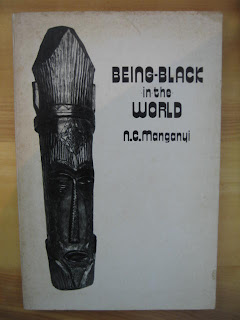 |
| Being-Black-in-the-World by Noel Chabani Manganyi |
In the 1970s and early 1980s Manganyi published a series of monographs, the first of which was Being-Black-in-the-World (1973), the last Looking Through the Keyhole (1981). In these works Manganyi examined incisively the effects of institutionalised racism on the internal worlds and external realities of South Africans. To this end, he explored a range of group and individual responses to the forms of institutionalised racism that characterised South Africa at the time, including alienation, distorted relations with the body, and the quest for freedom.
Central to these texts, too, was a concern with issues of identity development in oppressive social contexts such as apartheid South Africa. These early works were the first serious attempts by a South African psychologist to engage with the interface between the individual and society in the context of systematically asymmetrical relations of power and they were welcomed by many who were searching for a psychology better able to make sense of the internal and more explicitly social realities of the majority of South Africans. Significantly, too, the texts identified a number of critical imperatives for a more generative South African psychology. Arguably the most important of these was Manganyi's appeal, in Being-black-in-the-World and Looking Through the Keyhole, that mental health services be made more appropriate and accessible to all South Africans; a call that is still pertinent today.
Manganyi's examination of the effects of violence on individuals and groups, particularly in Mashangu's Reverie, published in 1977, in which he explores the place of the Black Consciousness Movement as the antithesis of the dominant and racist culture, is widely considered to be seminal in the field of psychology. The exploration of the phenomenon of violence is reprised and elaborated in his more recent publications. Manganyi's oeuvre has made a substantial contribution to South African psychology, a contribution which has still to be fully acknowledged.
When an in-depth history of the Black Consciousness Movement of the 1970s is written there is no doubt that Chabani Manganyi will be seen as a significant participant and one of the few who, before the Truth and Reconciliation Commission, took seriously the psychological effects of institutionalised racism, effects that still afflict our society profoundly.